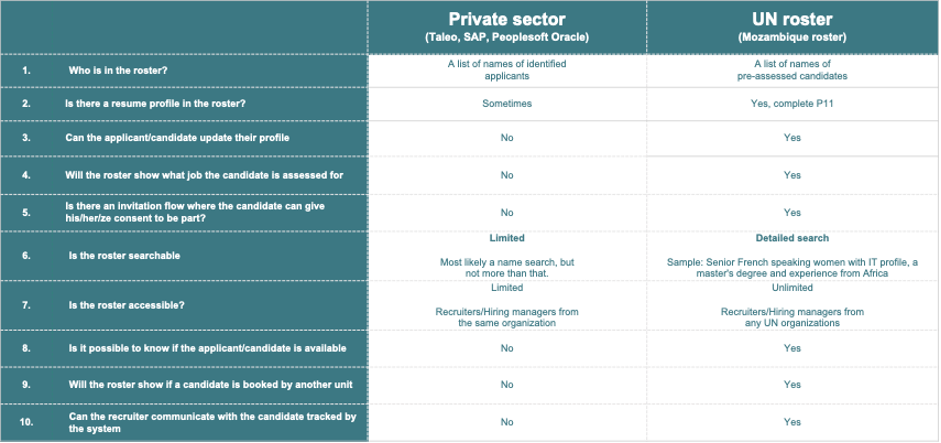Many international organizations (IO) conduct hundreds of interviews per month, but it is rare that their talent sourcing goes beyond the selected candidate.
Now, The Mozambique office is the first-ever UN office to build a roster filled with qualified talents and with shared access, where recruiters from all different organizations could log in to the roster and search for suitable, assessed, and recommended candidates.
How will the Roster be used?
In the future when IOM recruits a local contractor (i.e SB4, Monitoring, and Evaluation), the IOM recruiter can log into the shared roster and search the roster for other similar recruitments. And if Unicef recently concluded a similar process, IOM can either directly go ahead with the contracting or invite the person to their process.
Why has this not happened earlier?
”I think there are many reasons, not least political”, says Henrik Ryden, COO, and Co-founder of Impactpool.
He continues, “I built a roster for UNDP in Afghanistan back in 2011, which turn out to be a failure. That experience taught me a lot about how to build rosters successfully in the Impact sector.”
IO’s definition of talent rosters per se creates problems. In fact, the IO definition is not even close to the definition of Salesforce, Workday, SAP, PeopleSoft, Taleo, etc. But when IOs select roster providers, they tend to go with one of these established private sector vendors anyway.
The outcome is high unexpected costs for customizations and eventually a roster platform that doesn’t meet their needs.
The below matrix is an overview of some of the main differences between a roster in the private sector and a roster in an IO.

The UN Inspira team’s ambition of using Oracle’s roster platform could serve as an excellent example of when development costs skyrocketed. This roster project started in 2011, but the solution is still not close to what the UN management requested, what the UN team needs, nor what they have had in mind.
The roster in Mozambique
“To make the roster in Mozambique a success still requires hard structured work and a mutual agreement on how the roster should be used, clear roster ownership and user-guidelines will be essential for the roster to sustain.” says Henrik.
Henrik continues; “One thing that made my roster in Afghanistan fail was that hiring managers didn’t release all their alternate assessed and recommended candidates to the roster. They kept resumes of assessed and recommended talents hidden in their office desk drawers. When this became known to others the trust for the roster quickly disappeared, and when other hiring managers also started to hide talents, the roster quickly became bypassed.” The roster in Mozambique is designed by Impactpool and built exclusively for IOs. The roster access is easy and flexible. The assigned super-user can easily decide who should have access both inside the same organization and to recruiters of any other organizations. That is a unique access setup, that the UN Inspira team struggles with.
The screenshot below gives you a quick feel of the access granting screen for recruiters. Only an email, name, and functional role are needed to include a new hiring manager or recruiter.

Impactpool Candidate Search Console
The Impactpool Candidate Search Console is tailored for this sector. Impactpool is the most advanced provider of talent rosters tailored for an international recruitment context operated by IOs.
For an IO, it is critical to be able to search for candidates’ language skills, nationalities, years of experience, academic degree, what job he/she/ze has been assessed for, where he/she/ze has served in the past and if the candidate is available.
To check availability and ensure an updated profile, rostered candidates will be notified by the Impactpool system every 6 months to confirm their availability and update their profile. The Mozambique filtering functionalities are the most advanced in the market. You can get some inspiration below.

Would you like to learn more about the roster used in Mozambique or about rosters in general, please don’t hesitate to set up a meeting or a demo.
Use the contact form below.
 By
Magnus Bucht
By
Magnus Bucht